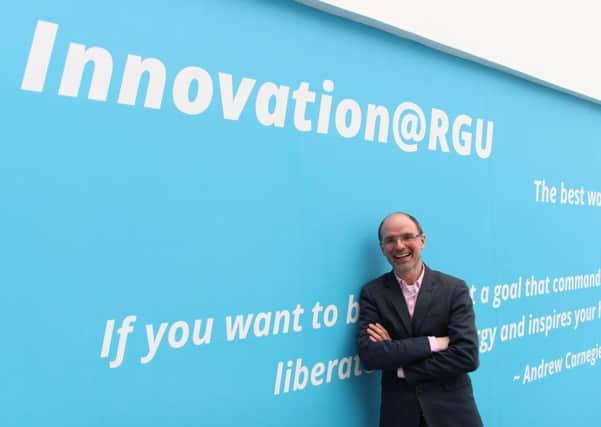Chris Moule: University in the business of collaboration and innovation


Scotland is a place where growth and innovation go hand in hand with wider benefits for all of society. Its culture of innovation and entrepreneurship is growing and diversifying the country’s business base, accelerating economic development and nurturing talent – a key feature of Scotland’s ‘CAN DO’ strategy.
Universities have a key role to play in fostering this entrepreneurial mindset. A curriculum and practical learning that encourage self-motivation and innovation cultivates a new generation of forward thinkers and self-starters who will create the new products, services and businesses that contribute to Scotland’s future economic and social prosperity.
Advertisement
Hide AdAdvertisement
Hide AdInnovation and entrepreneurship are at the core of the curriculum at Robert Gordon University (RGU). It provides learners from all walks of life with the ambition and skills to create, lead and grow successful businesses, encouraging entrepreneurship as a career choice and contributing to the economic development of the North East of Scotland.
Over the last year, RGU has introduced a series of integrated initiatives and programmes creating a vibrant entrepreneurship and innovation ecosystem. The RGU Start-up Accelerator, the only funded programme of its kind in the North-East of Scotland, supported 25 teams of staff, students and alumni to develop new businesses through training, mentorship and investment.
These start-ups cover a range of sectors and have significantly grown as a result. Many have already raised almost twice the seed funding they received, and are generating revenues and recruiting staff.
Providing spaces to collaborate, exchange and grow ideas is fundamental to fostering an innovative environment. The university has created an Innovation Station on its Garthdee campus and has partnered with Opportunity North East and ONECodebase on the creation of the ONE Tech Hub in the centre of Aberdeen to accelerate digital tech business growth in the North-East.
Innovation activities are often seen as an urban, city-bound process. Yet, entrepreneurship and creativity are very much part of the rural landscape, as they have always been. Scotland’s rural communities are hotbeds of new ideas and entrepreneurship. The OECD reports that nearly 70 per cent of growth takes place outside metropolitan hubs.
Recognising the importance of supporting rural entrepreneurship, RGU has partnered with Aberdeenshire Council to develop a network of new innovation spaces in libraries across the region, building a truly rural framework for a wider entrepreneurial ecosystem called the Library Innovation Network Aberdeenshire (LINA).
The partnership adds another layer to the 21st century library model and creates stronger collaboration between the university and the wider community, while stimulating the existing entrepreneurial spirit, supporting innovative ideas, reducing loneliness and building confidence.
The LINA spaces are designed to offer collaboration for rural communities with an emphasis on innovation and entrepreneurship. They are not just about supporting a new start-up or a freelancer but are creating opportunities for communities to come together to collectively solve problems – connecting people, building new networks and developing new thinking through what we call ‘creative collisions’.
Advertisement
Hide AdAdvertisement
Hide AdAlmost two-thirds of businesses in rural Scotland are counted as SMEs with a growing number of micro-businesses. By leveraging our existing on-campus programmes and the growing mentor group, LINA will also support existing SMEs across a range of industries – from agriculture to manufacturing, creative businesses to digital companies – helping them to grow and develop new products and services.
The current speed of change means that employees of Scottish businesses, many of whom reside in rural areas, need to be trained continuously to avoid the dangers of being displaced. This is particularly important given the speed of change that is starting to occur as the advances of digitalisation in the ‘fourth industrial revolution’ start to impact on a wide range of industries.
RGU’s vision is to provide accessible education and enhanced opportunities to everyone across society. Its focus is not only on encouraging entrepreneurial and innovative thinking and ways of working within the university. It is taking into account its broader role in economic development and extending its reach into the region to prepare the rural economy for an innovative, creative and productive future.
Chris Moule, head of the Entrepreneurship and Innovation Group at Robert Gordon University.